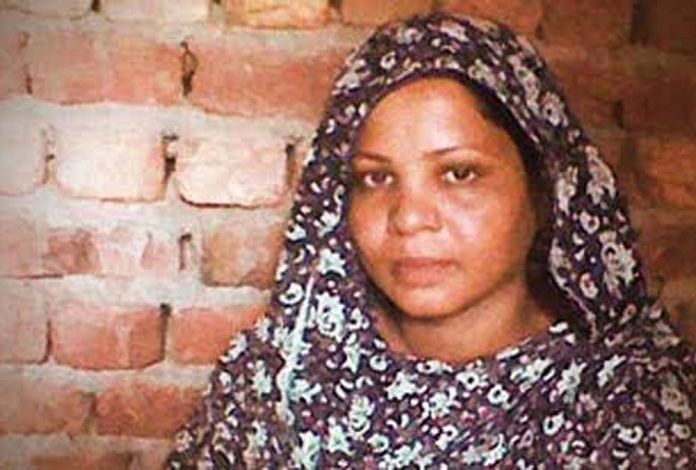Widespread violent protests have forced the Pakistani Christian woman to seek asylum after Supreme Court acquitted her.
New Delhi: Canada has offered asylum to the Pakistani Christian woman cleared of blasphemy charges, Asia Bibi, Prime Minister Justin Trudeau confirmed Monday amid reports that the mother of five children who was on death row for the past eight years faces extreme right-wing protests.
“We are in discussions with the Pakistani government,” Trudeau told AFP in Paris Monday.
However, he added that he wouldn’t say more because of the sensitivity of the case. “Canada is a welcoming country,” added Trudeau.
The Canadian prime minister’s comments came in the wake of reports from several nations offering Asia Bibi, her husband and children asylum. It also shines the light on one of the worst laws that continues to hold large swathes of Pakistan in its grip — blasphemy.
One-of-a-kind case
In the wake of the Asia Bibi acquittal some weeks ago, the two faces of Pakistan were clearly on display: One, a tiny minority applauding the Supreme Court judges for their valour on Twitter, while the other extreme right-wing fundamentalist groups who took their high-decibel protests to the streets and threatened to shut down Pakistan.
Several Twitter users in Pakistan posted videos of the extent of violence unleashed in the country.
Several vehicles have been set on fire by protesters on the main highway (the Motorway) linking Lahore and Islamabad – this is near Sheikhupura just outside Lahore pic.twitter.com/yUZXv1qA4p
— omar r quraishi (@omar_quraishi) November 1, 2018
None of this is in the media. Total blackout. pic.twitter.com/92fdI1OImo
— Gul Bukhari (@GulBukhari) November 2, 2018
As the world took notice of these Islamic hardliners, speculation whether Pakistan’s situation could actually worsen was rife.
To be sure, Prime Minister Imran Khan came out on TV, appealing to the hardliners not to challenge the rule of law. But the Tehreek-i-Labbaik (TLP) protesters were out on the streets, laughing at the PM’s suggestion and inciting those who worked for him to kill him because he was daring to defend a so-called “blasphemer”.
Asia Bibi’s case is certainly one of a kind. Her story begins in Pakistan’s Sheikhupura district in the heart of Punjab in 2009, where the 53-year-old farm labourer lived with her husband Ashiq Masih and their five children.
Also read: Asia Bibi flees, says Pak media, foreign office denies reports
The incident
On 14 June 2009, Asia Bibi was working on a farm with two women, Asma Bibi and Mafia Bibi, when she got into an altercation with the two Muslim sisters.
The Muslim women refused to drink water from the same vessel as Asia Bibi, citing this was forbidden in Islam.
Asma and Mafia approached their locality’s Islamic cleric Qari Mohammad Salaam and his wife who taught them Quran, with the complaint that Asia Bibi has made derogatory remarks against the Prophet Muhammad. An FIR was subsequently lodged by the cleric.
According to the prosecution, on 19 June 2009, Asia Bibi confessed to have made three “sarcastic and defamatory” remarks against Prophet Mohammad at a public gathering. The Supreme Court, though, in its final judgment noted that there were several variations in the statements given by prosecution witnesses.
Asia was convicted on charges of blasphemy and handed down a death sentence by a trial court in 2010 whose order was upheld by the Lahore High Court (LHC) in 2014. She then filed an appeal the same year challenging the court’s verdict.
In 2011, two high-profile politicians — former Punjab governor Salman Taseer and former minorities affairs minister Shahbaz Bhatti — were assassinated simply because they chose to speak up for Asia Bibi and for the rights of the Christian minority community in Pakistan.
Acquittal
The Supreme Court’s verdict on 31 October acquitting Asia of all the charges was nothing short of a watershed in the history of Pakistan which has seen more than 1,300 people being booked for crimes related to blasphemy under various sections of the blasphemy law.
The 56-page long verdict was also considered historic as scores of Quranic verses were read out throughout the judgment to establish that Islam is not a religion of intolerance but one which refuses to demand strict punishment to anybody found guilty of speaking against the religion.
As extreme right-wing protests broke out across the country, a review petition was filed on 1 November by the same complainant who claimed that the judgment had several lacunae. He also demanded that Asia not be allowed to leave the country.
Government reaction
In a blistering condemnation of the havoc created by the agitators, PM Khan warned them “not to clash with the state”. But as he flew to China for a scheduled visit, the government quickly succumbed to the clerics’ demands.
The most problematic element of the five-point agreement was the clause to put Asia on the Exit Control List, thereby banning her movement out of the country. Information Minister Fawad Chaudhry admitted this was only a means of “firefighting” and not “cure” to the actual problem of widespread extremism.
After Trudeau’ comments, Pakistan’s foreign ministry spokesperson said Islamabad fully respects Asia Bibi’s rights.
Also read: Pak far-right parties have not got over Asia Bibi verdict yet as another march is in the offing
The blasphemy problem
Established under the regime of former president and military ruler General Zia ul-Haq, Section 295-C of the Pakistan Penal Code penalises an individual with death penalty who dares to pass derogatory remarks against Prophet Muhammad.
The provision of awarding death penalty was incorporated only in 1986.
According to a report in Nation, in the decades since the 1990s, more than 4,000 cases of blasphemy have been reported as opposed to only 10 from 1927 to 1985.



